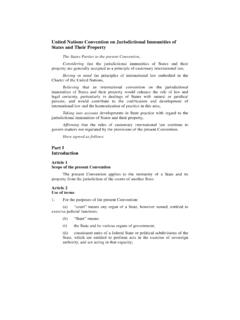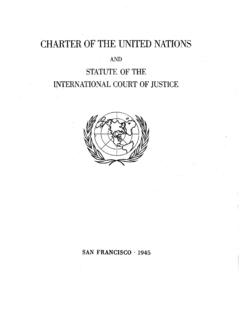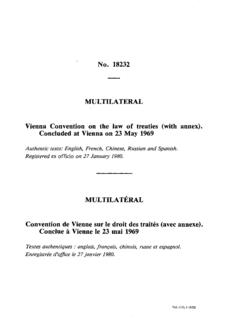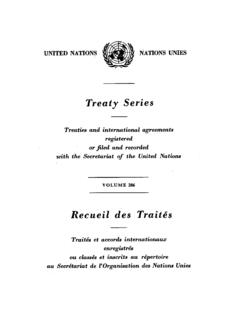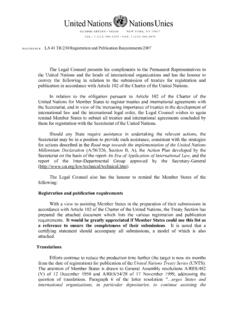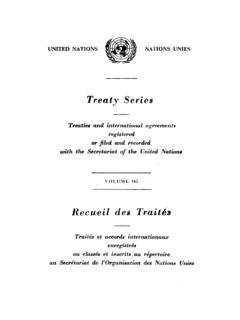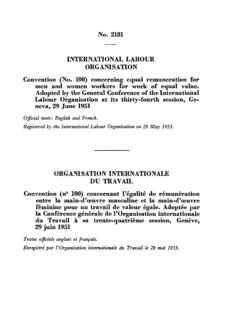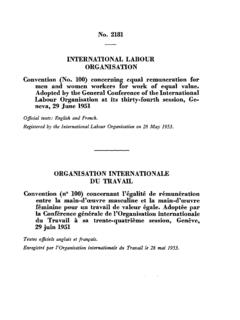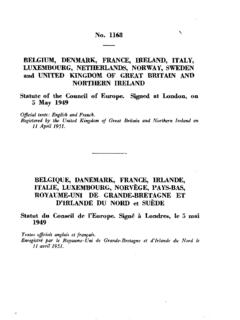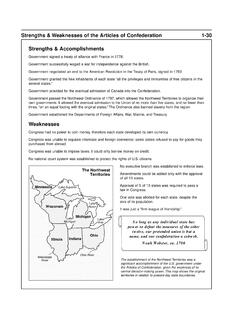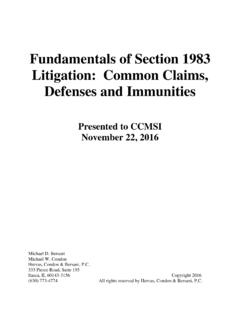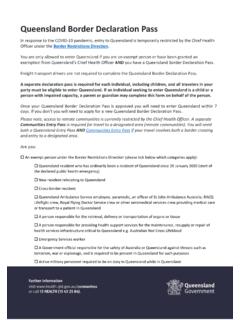Transcription of Chapter III. Privileges and Immunities, Diplomatic and ...
1 DOCUMENT INFORMATIONFILE NAME : Ch_III_3 VOLUME : VOL-1 Chapter : Chapter III. Privileges and immunities , Diplomaticand Consular Relations, : 3. Vienna Convention on Diplomatic Relations. Vienna18 April 1961 UNITED NATIONS CONFERENCEON Diplomatic INTERCOURSE AND IMMUNITIESVIENNA CONVENTIONONDIPLOMATIC RELATIONSUNITED NATIONS1961 VIENNA CONVENTION ON Diplomatic RELATIONSThe States Parties to the present Convention,Recalling that peoples of all nations from anoient times haverecognized the status of Diplomatic agenta,Having in mind the purposes and principles of the Charter of theUnited Nations concerning the sovereign equality of States, themaintenance of international peace and security, and the promotion offriendly relations among nations,Believing that an international convention on Diplomatic intercourse, Privileges and immunities would contribute to the development of friendlyrelations among nations.
2 Irrespective of their differing constitutionaland social systems,Realizing that the purpose of such Privileges and immunities is notto benefit individuals hut to ensure the efficient performance of thefunctions of Diplomatic missions as representing States,Affirming that the rules of customary international law shouldcontinue to govern questions not expressly regulated by the provisionsof the present Convention,Have agreed as followssArticle 1 For the purpose of the present Convention, the following expressionsshall have the meanings hereunder assigned to thems(a) the "head of the mission" is the person charged by the sending Statewith the duty of acting in that capacity;(b) the "members of the mission" are the head of the mission and themembers of the staff of the mission;- 1 -(о,) the "members of the staff of the mission11 are the members of thediplomatic staff, of the administrative and technical staff and ofthe service staff of the mission;( ) the "members of the Diplomatic staff" are the members of the staffof the mission having Diplomatic rank;( ) a " Diplomatic agent" is the head of the mission or member of thediplomatie staff of the mission;the "members of the administrative and technical staff* are themembers of the staff of the mission employed in the administrativeand technical service of the mission.
3 (g) the "members of the service staff" are the members of the staff ofthe mission in the domestic service of the mission;(h) a "private servant" is a person who is in the domestic service of amember of the mission and who is not an employee of the sendingState;( ) the "premises of the mission" are the buildings or parts ofbuildings and the land ancillary thereto, irrespective of ownership,used for the purposes of the mission including the residence' of thehead of the 2 The establishment of Diplomatic relations between States, and ofpermanent Diplomatic missions, takes place by mutual 31. The functions of a Diplomatic mission consist inter alia insrepresenting the sending State in the receiving State;- 2 -protecting in the receiving State the interests of the sending/State and of its nationals, within the limits permitted byinternational law;negotiating with the Government of the receiving State;( ) ascertaining by all lawful means conditions and developments in' the receiving State, and reporting thereon to the Government of thesending State;( ) promoting friendly relations between the sending State and thereceiving State, and developing their economic, cultural andscientific relations*2.
4 Nothing in the present Convention shall be construed aspreventing the performance of consular functions by a 41* The sending State must make certain that the agr ment of thereceiving State has been given for the person it proposes to accredit ashead of the mission to that The receiving State is not obliged to give reasons to thesending State for a refusal of agr 51. The sending State may after it has given due notification tothe receiving States concerned, accredit a head of mission or aaeign an/ ember of the Diplomatic staff, as the case may be, to more than oneStats, unless there is express objection by any of the receiving If the sending State accredits a head of mission to one or moroother States it may establish a Diplomatic mission headed by a charged'affaires ad interim in each State where the head of mission has nothis permanent 3 -3* A head of mission or any member of the Diplomatic staff of themission may aot as representative of the sending State to anyinternational 6 Two or more States may accredit the same person as head of missionto another State.
5 Unless objection is offered by the receiving 7 Subject to the provisions of Articles 5 8 9 and 11 the sendingState may freely appoint the members of the staff of the mission. In thecase of military naval or air attaches, the receiving State may requiretheir names to be submitted beforehand, for its 81. Members of the Diplomatic staff of the mission should inprinciple be of the nationality of the sending Members of the Diplomatic staff of the mission may not beappointed from among persons having the nationality of the receivingState, except with the consent of that State which may be withdrawn atany * The receiving State may reserve the same right with regard tonationals of a third State who are not also nationals of the 91 The receiving State may at any time and without having toexplain its decision*, notify the sending State that the head of themission or any member of the Diplomatic staff of the mission is persona- 4 -non grata or that any other member of the staff of the mission is notacceptable.
6 In any such case, the sending State shall, as appropriate,either recall the person concerned or terminate his functiofls with themission. A person may be declared non grata or not acceptable beforearriving in the territory of the reoeiving If the sending State refuses or fails within a reasonable periodto oarry out its obligations under paragraph 1 of this Article, thereoeiving State may refuse to recognize the person concerned аз a memberof the 101. The Ministry for Foreign Affairs of the reoeiving State, or suohother ministry as may be agreed, shall be notified of:(a) the appointment of members of the mission, their arrival and theirfinal departure or the termination of their functions with themission;(b) the arrival and final departure of a person belonging to the familyof a member of the mission and, where appropriate, the fact that aperson becomes or ceases to be a member of the family of a member ofthe mission;(o) the arrival and final departure of private servants in the employ ofpersons referred to in sub-paragraph (_a) of this paragraph and, whereappropriate, the fact that they are leaving the employ of suchpersons.
7 ( ) the engagement and discharge of persons resident in the receivingState as members of the mission or private servants entitled toprivileges and Where possible, prior notification of arrival and finaldeparture shall also be 111. In the absence of specific agreement as to the size of themission, the receiving State may require that the size of a mission be- 5 -kept within limits considered by it to be reasonable and normal, havingregard to circumstances and conditions in the receiving State and to theneeds of the particular mission*2. The receiving State may equally, within similar bounds and on anon-discriminatory basis, refuse to accept officials of a 12 The sending State may not, without the prior express consent of thereceiving State, establish offices forming part of the mission inlocalities other than those in which the mission itself is established*Article 131* The head of the mission is considered as having taken up hisfunctions in the receiving State either when he has presented hiscredentials or when he has notified his arrival and a true copy of hiscredentials has been presented to the Ministry for Foreign Affairs of thereceiving State, or such other ministry as may be agreed.
8 In accordancewith the practice prevailing in the receiving State which shall beapplied in a uniform The order of presentation of credentials or of a true copythereof will be determined by the date and time of the arrival of thehead of the 141* Heads of mission are divided into three classes, namely s(aj that of ambassadors or nuncios accredited to Heads of State, andother heads of mission of equivalent rank}(jb) that of envoys, ministers and internuncios accredited to Heads ofState;- 6 -(pj that of charges d'affaires accredited to Ministers for Except as concerns precedence and etiquette, there shall be nodifferentiation between heads of mission by reason of their 15 The class to which the heads of their missions are to be assignedshall be agreed between 161.))
9 Heads of mission shall take precedence in their respectiveclasses in the order of the date and time of taking up their functionsin accordance with Article 13*2. Alterations in the credentials of a head of mission notinvolving any change of class shall not affect his This article is without prejudice to any practice accepted bythe receiving State regarding the precedence of the representative of theHoly 17 The precedence of the members of the Diplomatic staff of the missionshall be notified by the head of the mission to the Ministry for ForeignAffairs or such other ministry as may be 18 The procedure to be observed in each State for the reception ofheads of mission shall be uniform in respect of each 191. If the post of head of the mission is vacant, or if the head ofthe mission is unable to perform his functions, a charge* d'affaires ad- 7 -interim shall aot provisionally as head of the mission.
10 The name of thecharge d'affaires ad interim shall be notified, either by the head of themission or, in case he is unable to do so, by the Ministry for ForeignAffairs of the sending State to the Ministry for Foreign Affaire of thereceiving State or su oh other ministry as may be In eases where no member of the Diplomatic staff of the missionis present in the receiving State, a member of the administrative andtechnical staff may, with the consent of the receiving State, bedesignated by the sending State to be in charge of the current adminis-trative affaire of the 20 The mission and its head shall have the right to use the flag andemblem of the sending State on the premises of the mission, including theresidence of the head of the mission, and on his means of transport*Article 211.
